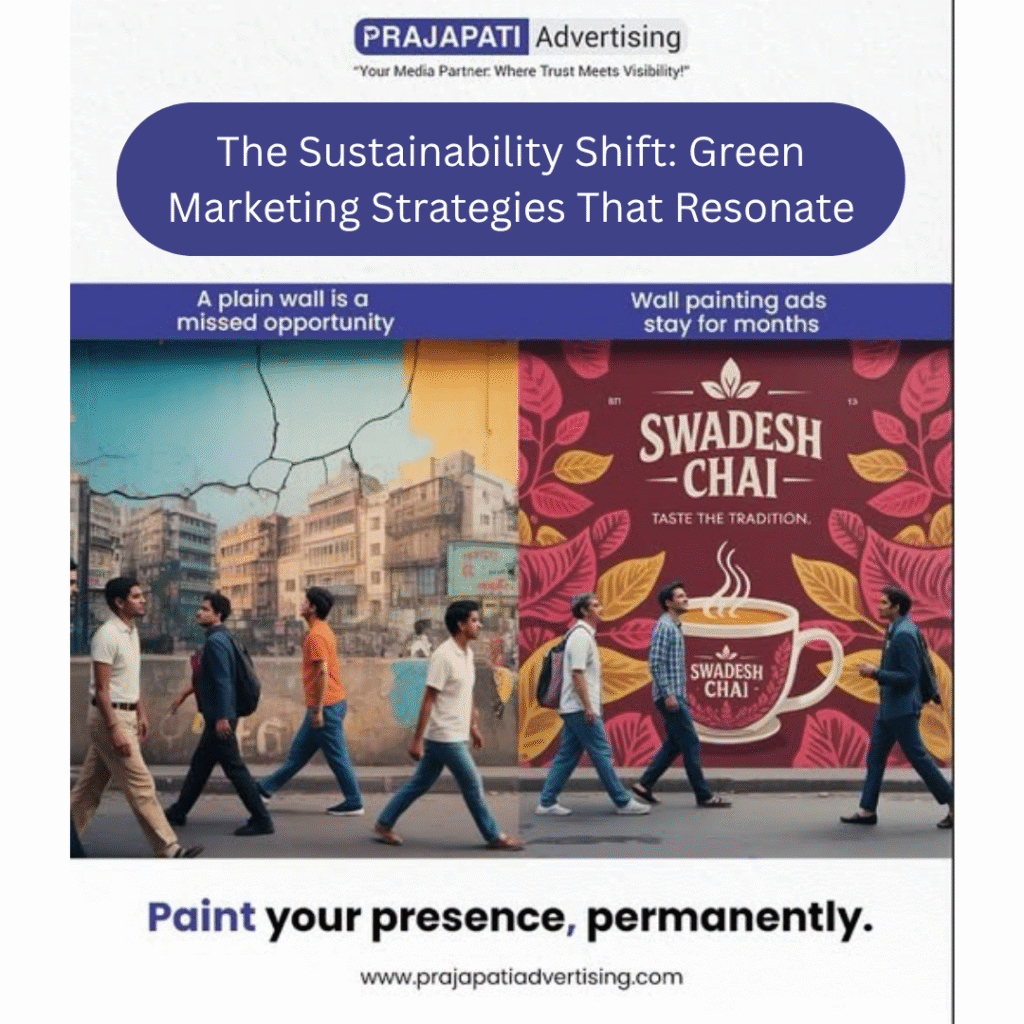The global inclination toward environmental responsibility isn’t merely a fleeting trend. It denotes a paradigm shift in consumer needs, preferences, and values
Today’s discerning consumer expects their brand to be responsible. Many strictly prefer to use only products with sustainable ingredients, components, or elements.
However, this change isn’t anchored to the choice of products, but also marketing strategies. Brands are also innovating marketing strategies that resonate with their environmentally conscious target audiences.
As an advertising agency in Pune, we think it is necessary to discuss green marketing strategies. Not because they’ve become popular but because they represent a transformation. Let us explore them.
- Authentic Storytelling. Not Over Greenwashing
Today’s consumer is savvier than ever before. They can sense insincerity from a mile or two away. Therefore, brands cannot merely boast about their sustainability endeavors or present theories. Instead, they must showcase authentic stories that speak about their sustainability programs. These initiatives can be diverse and include reducing energy use, ethical sourcing, reuse, recycling, curbing the use of water, etc.

- Sustainable Product Design
Sustainability begins at the fundamental level. Therefore, product design, which is the most basic aspect of every product creation, must incorporate the green approach. Most brands understand this. Accordingly, they are redesigning products to minimize environmental impact through sustainable materials, recycling, reusing, repurposing, etc. A genuinely green product gives an organic, sustainable touch to its marketing as well.
- Supply Chain Transparency
Supply chains have always been complex and lengthy. Therefore, consumers weren’t concerned about them a decade or two ago. However, the aware, new-age customers want to know where their products come from. They also want to understand the players involved in making them and those bringing them to their table.
This is where highlighting a traceable, ethical supply chain comes into play. It demonstrates accountability and the brand’s responsibility towards its customers.
Some strategies in this regard can include sharing green certifications, audit proof, supplier agreements, etc. These can reinforce a brand’s commitment to green practices.
- Not Selling!
Employing sustainable practices is a great idea. Rather, it is necessary. However, most of them cost more upfront, resulting in higher prices for consumers. In situations like these, the very customers who demand green practices may begin ignoring such expensive products. It is because they wouldn’t know why a brand’s products are significantly costlier than others. But this may happen if brands do not justify the price and value.
Accordingly, brands must invest in marketing content through blogs, videos, and social media to educate customers on why sustainability matters, its benefits, and explain the true costs their products and processes help save.
After that, customers wouldn’t mind spending a little more to keep the planet green!
- Using Digital Platforms
This is a given! Digital media has become the de facto medium of advertising, marketing, and promotion. It offers endless opportunities and platforms to brands to communicate their sustainability values. Brands can leverage them to tell interactive stories of their eco-friendly practices, influencer collaborations, supplier partnerships, etc., through Instagram and YouTube so that they reach more people.
- Community Involvement
Partnering with communities and marketing their involvement in sustainability initiatives is one of the most effective green marketing strategies. People love it when they see someone amongst them participate in brand-driven, responsible initiatives.
Therefore, brands can partner with local communities, NGOs, or environmental organizations to add authenticity and broaden their reach. Popular initiatives such as waste management programs, tree-planting drives, or circular economy projects can benefit the planet and also create deeper connections with the audiences.
- Incentivizing Green Choices
While marketing responsible initiatives is an excellent marketing strategy, incentivizing green choices is even better! Therefore, brands can encourage consumers to act sustainably by rewarding eco-friendly behavior. For instance, they can provide discounts for recycling packaging or loyalty points for sustainable purchases. While fostering engagement, such programs also reinforce a brand’s green endeavors.
- Measuring Impact and Communicating Outcomes
Merely indulging in sustainability programs doesn’t suffice. Brands must also measure the impact of their efforts. For instance, doing so can include how much carbon emissions a particular brand has reduced over a period, with an initiative. Another example can include the number of trees planted and how well they’ve been cared for.
Nevertheless, again, measuring the outcomes isn’t enough. We are talking about marketing here. Therefore, sharing reports and certifications from a reputable firm can create a significant impact and showcase a brand’s dedication to sustainability.
Looking to Amplify Your Green Marketing Strategy?
Partner with Prajapati Advertising! We are an advertising agency in Pune that values sustainability and helps brands innovate green marketing strategies that help enhance their responsible image. Our team understands your green initiatives and crafts effective strategies that help you stand out as a sustainable brand.
So, why wait? If you’re contributing to making the planet greener, talk about it loudly and proudly. We are here to help you market your sustainability impact. Please call us at +91 +91 99 22 138 138 to explore more about our support and services.
